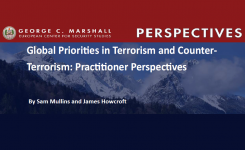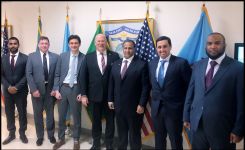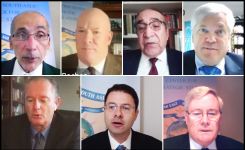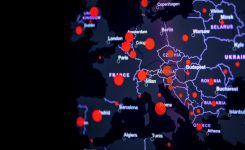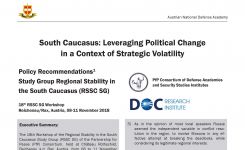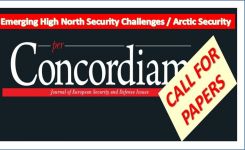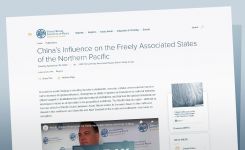Security Studies

Podcast: Dr. Perl on working both separately and together to address global security problems
ISN Video In this podcast, Raphael Perl discusses how a multitude of networks and non-aligned states have been working both separately and together to address global security problems. We need both frameworks, he argues, if we are to surmount the institutional inertia that continues to...
Policy Guidance for Pakistan’s Oscillation Response to COVID-19
“Policy Guidance for Pakistan’s Oscillation Response to COVID-19” is a new OpEd coauthored by DKI APCSS professor Dr. Deon Canyon and Asma Khawaja – Strategic Studies, National Defence University, Islamabad, for Security Nexus. In this paper, the authors detail how shifting policy guidance...
Politics by Numbers: Counting Plato’s Shadows
James Sullivan is currently a non-resident Visiting Scholar at the Daniel K. Inouye Asia Pacific Center for Security Studies and is pursuing an ALM in International Relations from Harvard Extension School.His paper analyzes China’s use of tone when addressing various security issues relevant...
PTSS Faculty Publish Results of CT Survey
This research note reports the results of a pilot questionnaire on priorities in terrorism and counter-terrorism, which was completed by seventy-five security-sector professionals from more than fifty countries who attended the Program on Terrorism and Security Studies (PTSS) at the George C....
PTSS Program Director James Howcroft Published in The American Interest
PTSS Program Director James Howcroft Published an article in The American Interest online magazine. The article explores how to put intelligence to work against ISIS terrorists returning from Syria to their countries of origin. Full text of the article, entitled "Dare to Share", can be...
Qatar Armed Forces Doctrine and Concepts Visit
The Near East South Asia (NESA) Center for Strategic Studies hosted the visit of the Director of the Qatar Armed Forces Doctrine and Concepts Center, General Abdullah al-Ammari, and his staff on 15 March 2023 in Washington, D.C. NESA Center Deputy Director COL David Lamm, USA (Ret.) and NESA...
Qatar Joint Staff College Visit
From 15–20 May 2022, the NESA Center hosted the Washington Visit of Qatar’s Joaan bin Jassim Command and Staff College Senior Officer Program in Washington, DC. The 35 participants included senior military officers and senior leaders from various Qatari government agencies. This program was...
Qatari Diplomatic Institute Virtual Seminar
From 08-10 November 2021, Dr. Gawdat Bahgat led the Qatari Diplomatic Institute Virtual Seminar to help foster a shared understanding of the evolving strategic landscape in the Middle East and promote mutual cooperation. The seminar was attended by over 100 officials from the Qatari Ministry...
Raytheon Royal Saudi Air Defense Forces Executive Leadership Program
On 17-29 October 2021, The Near East South Asia Center for Strategic Studies (NESA Center) held a Raytheon Royal Saudi Air Defense Forces Executive Leadership Program in Washington DC and Boston, Massachusetts. Major General Abdullah al Qahtani (head of the Royal Saudi Air Defense Forces...
Re-accreditation of the M.A. International Security Studies (MISS)
By Frank Mouritz Academic Coordinator and Deputy Director M.A. International Security Studies (MISS) GARMISCH-PARTENKIRCHEN, Germany (Feb. 20, 2019) – The master’s program in International Security Studies (MISS), which is offered jointly by the Marshall Center and the Bundeswehr...

Reawakening of Japanese Nationalism
APCSS' professors Dr. Jeffrey Hornung and Dr.David Fouse, as well as former APCSS professor Dr. Yoshiro Sato, appeared on "Asia in Review" to discuss "Reawakening of Japanese Nationalism". Here is the link to the recorded program: http://www.youtube.com/playlist?list=...
Recommendations for Policy Makers in the Western Balkans are Out
Vienna, Austria, 6 December 2021- The PfPC’s Regional Stability in South East Europe Working Group (RSSEE WG) published policy recommendations from its 41st Workshop titled “Regional Security Cooperation in South Europe in the Aftermath of North Macedonia’s NATO Accession” through the Austrian...
Recommendations from Papua New Guinea on How to Improve U.S. Posture in the Pacific
Excerpt: The Pacific Ocean is a place of many small countries that need to strategically cooperate, not compete, to survive. The best way forward is for all nations to cooperate with each other as they tackle the greatest threats and make the world a safer place. The U.S. and China have...

Regional Security Cooperation in the Maghreb and Sahel: Algeria’s Pivotal Ambivalence
By Laurence Aïda Ammour. Africa Center for Strategic Studies, February 2012. Despite growing concerns across the Sahel and Maghreb over the increasing potency of al Qaeda in the Islamic Maghreb, the diffusion of heavily armed mercenaries from Libya, the expanding influence of arms and...
Regional Stability in the South Caucasus Study Group (RSSC SG) recommends the establishment of an “OSCE Minsk Group Plus (+)”.
The Minsk Group Plus (+) recommendation is included in a list resulting from a November 2018 RSSC SG workshop; ”South Caucasus: Leveraging Political Change in a Context of Strategic Volatility”. Additional recommendations include: Refreshing the mediation process for the Nagorno-...
Religion in a Values-Based Approach to Strategic Competition
“Religion in a Values-Based Approach to Strategic Competition” is the title of a paper written by DKI APCSS professor Dr. Alfred Oehlers forSecurity Nexus. This article asks the question “Can we bring religious faiths and beliefs to bear in our strategic competition with our competitors?”...
Reminder: Marshall Center Alumni Call for Papers!
Attention Marshall Center Alumni, We are still seeking alumni contributors for the next edition of per Concordiam, which will examine the topic of “Emerging High North Security Challenges”. Please consider this opportunity to be published in the Marshall Center’s premier journal. per...
Report from the Research Field: The Alumni Scholarship Experience
Report from the Research Field: The Alumni Scholarship Experience By John Quinn, 2021 Alumni Scholar I first came across the George C. Marshal European Center for Security Studies, or The Marshall Center, webpage after Russian annexation of the Crimean Peninsula and tanks seized much of...
Report on China’s Influence on the Freely Associated States of the Northern Pacific
“China’s Influence on the Freely Associated States of the Northern Pacific” was published September 2022 by the United States Institute of Peace (USIP).Dr. Lori Formancontributed to this report as part ofthe USIP China-Freely Associated States Senior Study Group led byAdmiral (Ret.) Philip...
Roundtable Discussion on the Pros & Cons of Ankara’s Balancing Act with the Ukraine-Russia War
In acknowledgment of the one year since Russia began its full-scale invasion in Ukraine, Near East South Asia (NESA) Center for Strategic Studies Executive Officer Sam Marrero moderated a roundtable withNigar Gökselfrom Crisis Group Türkiye on Friday, 3 March 2023, on the ‘Pros and Cons of...
Pages

Deficiencies in Global Governance and Implications for Defense Education
Those contributing to international peace and stability act in an ever-changing, increasingly complex and inter-connected global environment. The international security landscape has changed considerably during the last twenty years, with important power shifts in international affairs, an...

Some Key Principles of Multinational Military Education
Education is something that touches every single member of the military profession, and is important for the civilians who work with the military as well. Military education is something with which everyone in the military has some direct experience. After all, one could not get to top military...

Central Asia and the Afghanistan Security Dilemma: Amelioration, Retrograde, or Status Quo? Central Asia’s Role in Regional Security Regarding Afghanistan after 2014
The regional security of Central Asia hinges on the level of stability within Afghanistan and its foreign relations with its neighbors. Afghanistan is not only pivotal in the maintenance of regional security, but is also crucial to the region’s economic and political development. As Ashraf Ghani,...

Strategic Communication for Security & National Defense: Proposal for an Interdisciplinary Approach
Most recent military actions have provided stark examples of the increasing power of communications in the public and governmental arena regarding the role that direct actors play in disputes characterized as “conflicts of interests.” These examples have also shown how communications can...

The Asymmetric Warfare Environment as Described by the Participants
The completion of a cross-national research study on a sizeable sample of military personnel who had participated in asymmetric warfare operations has resulted in a variety and breadth of survey material that is deserving of further examination. Additional study of the data gathered in this...

NATO’s Energy Security Policy Put to the Caspian Test
As a bridge between the Middle East, the former Soviet republics, and the Euro-Atlantic zone, the Caspian Sea is increasingly at the center of the global geopolitical and commercial game. In addition to its strategic location, the Caspian Sea, according to analysts, could contain between 6 and 10...

Ballistic Missile Defense in Poland: Did the Costs Outweigh the Benefits?
The government of Poland has addressed a number of difficult national security issues since the nation regained its independence from Soviet control in 1989. Longstanding border disputes with neighboring countries and the perceived disparate treatment of Polish minorities in these countries are...

Conditionality and Compliance: The Shaky Dimensions of NATO Influence (The Georgian Case)
It is no secret that NATO exerts global influence, and is an organization without which the international security architecture would be difficult to imagine. Its capacity to exert influence ranges from the very material dimension of military power to the elusive and intangible effects of...
Solving the Syrian Knot: Dynamics within the UN Security Council and Challenges to its Effectiveness
This article intends to highlight the dynamics within the UN Security Council(UNSC) with regard to the events in the Syrian Arab Republic that have unfolded in the wake of the so-called “Arab Spring” and perturbed the entire region of the Middle East. What had begun as peaceful demonstrations...
The Future of the Sinai Peninsula
The Sinai Peninsula has been a center of conflict for many years, starting with the first Arab-Israeli war in 1948. After Israel and Egypt signed the Camp David Accords in 1978, it became a peaceful region, strongly controlled by the military during Hosni Mubarak’s rule in Cairo. Now, after several...

The Models of Sovereignty in the South Caucasus
Over the last five to six years we have witnessed dramatic changes in the international security environment – changes that have directly influenced developments in the South Caucasus. Among the most significant changes are the world economic crisis, the Arab awakening, and the turbulence and civil...

Afghanistan 2001–2014: The Enduring Literature?
Do we have a problem with book publishers? Are we getting a reliable supply of material covering the ongoing war in Afghanistan – this far-too-long, post-9/11 conflict? That there are lots of books is not in doubt – but do they help chart a course for the future? Do they locate the conflict in ways...

The Challenge of Sustaining US Influence in Latin America in the 21st Century
Influential international affairs author Robert Kaplan postulated during a recent speech in Washington DC that the contemporary effects of advanced technology and other factors of globalization does not change the world’s geography, "but has intensified it." Kaplan also noted the aftershocks of the...
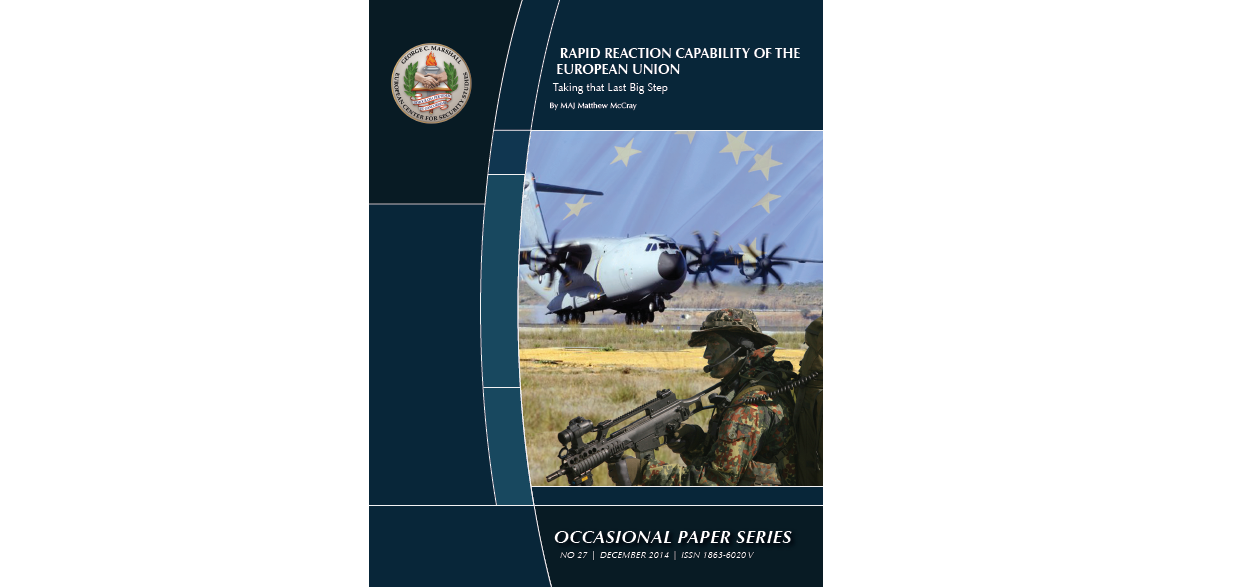
Marshall Center Occasional Papers
The Marshall Center Occasional Paper series provides a publication forum for research topics in the wide scope of political-military affairs. Occasional Papers are written by Marshall Center faculty and research staff, Marshall Center alumni and invited contributors. Theseriescan be found on the...
DKI APCSS Monthly Activities Report
The DKI APCSS Monthly Activities Reports are now online at: https://www.mynewsletterbuilder.com/email/newsletter/1410730387
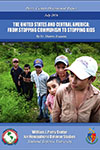
The United States and Central America: From Stopping Communism to Stopping Kids
The Northern Triangle countries of Central America consisting of El Salvador, Guatemala, and Honduras have the highest homicide rates in the world and are characterized by corruption, drug trafficking, and impunity. It is likely the 50,000 unaccompanied alien children attempting to cross into the...

DKI APCSS Monthly Activities Report
Our latest Monthly Activities Report is now available online at: https://www.mynewsletterbuilder.com/email/newsletter/1412847016

Disunity in Global Jihad: A Preface
As this special issue on “Disunity in global Jihad” goes into print in January 2017, the Islamic State (IS) is facing a possible military defeat throughout its territory in Northern Iraq and Syria. Yet, at the same time, it has proudly claimed responsibility for the 19 December 2016 lorry attack on...

The Mole and the Mallet: Islamic State and al-Qaeda in the ‘Thirty Years' War’ in the Middle East
This article investigates the developments of al-Qaida and The Islamic State in the context of the war on terror. The Iraq war 2003–2010, including the US Counterinsurgency strategy implemented in Iraq in 2007 onwards, together with the political developments in Iraq after the US withdrawal of...



